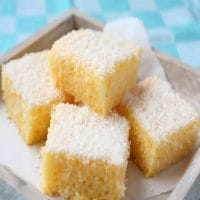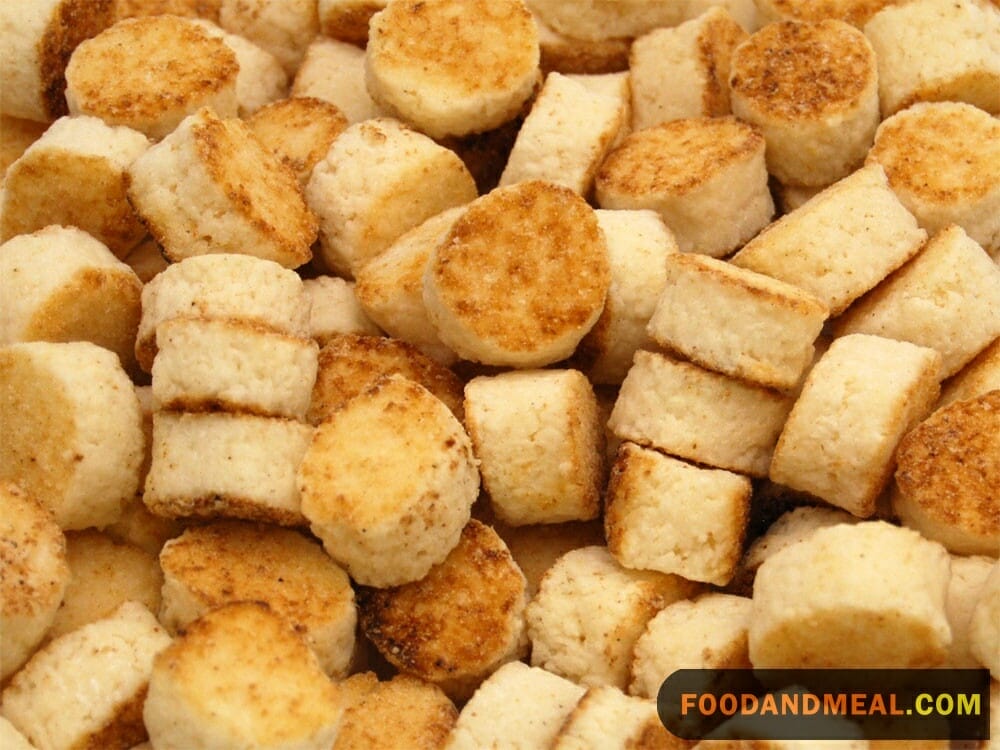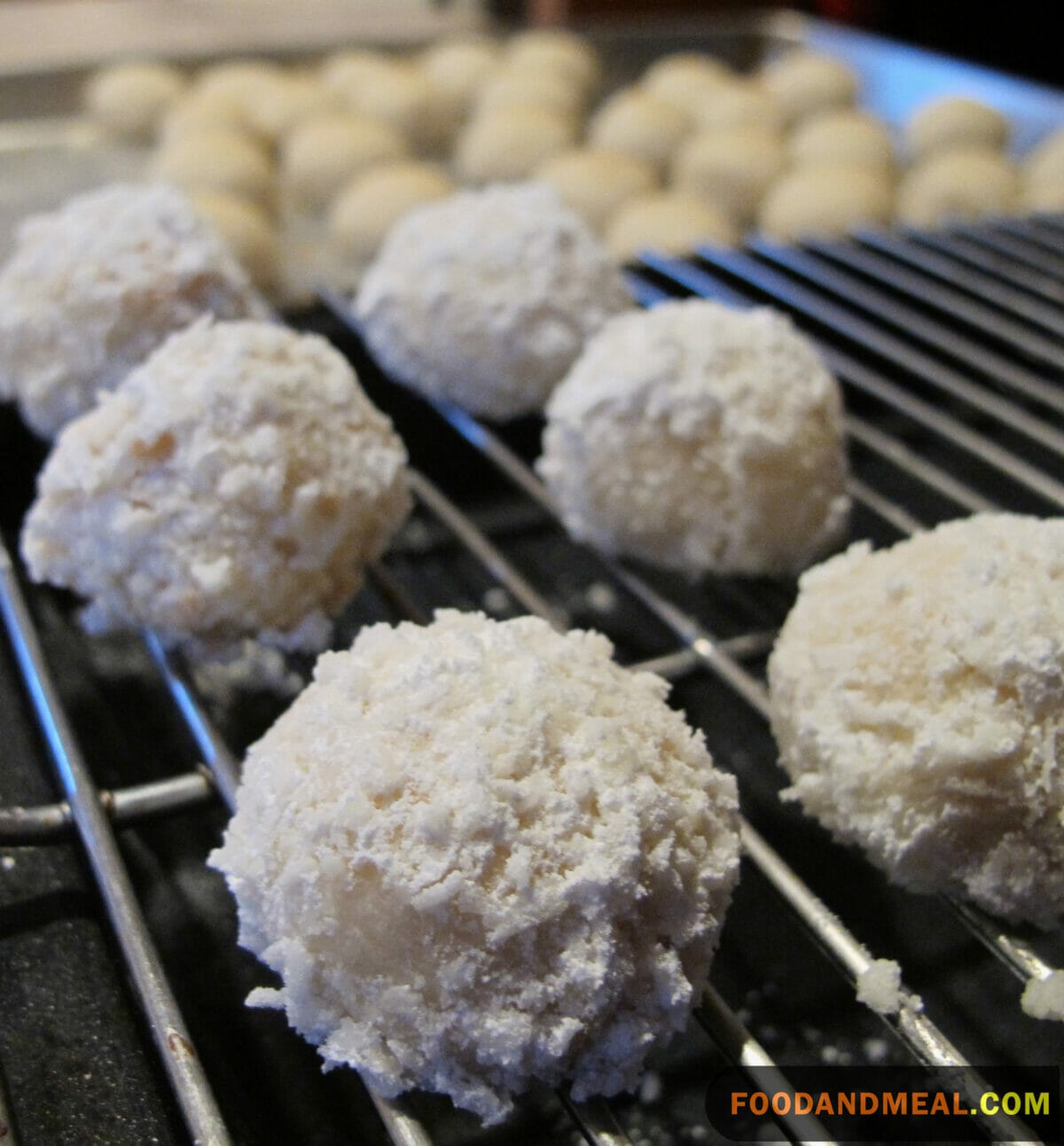A gentle waft of sweet, toasted coconut lingers in the air, igniting a warmth I carry with me into the kitchen—my safe haven, my canvas for culinary creation. Today, the vibrant hues and bustling vibrancy of the Moroccan markets I’ve long dreamt of experiencing translate themselves into my latest daring and delightful experiment: Moroccan Coconut Tea Cakes.
Each time I grasp a handful of shredded coconut, images of sun-basked terraces and the melodies of traditional lutes transport me, and I’m reminded that food is not just sustenance, but a voyage—a passport to worlds both known and unknown. It’s a sentiment we, at Food and Meal, cherish deeply. Our shared journey through global cuisines has brought me here, to the revered ritual of Moroccan tea time, a cornerstone of hospitality and grace in a land of remarkable contrasts and exquisite tastes.
I find myself particularly drawn to the Moroccan Coconut Tea Cakes because they embody a soulful blend of simplicity and elegance. There’s a comforting sense of homecoming in their making: a batter tenderly folded, whispering of history, culture, and the hands of countless Moroccan home cooks before me. Each cake is a small, sweet tribute to artisanal craft, a soft pillow of flavor nestled eagerly beside a steaming cup of mint tea. They speak of the easy laughter shared around the hearth, of stories told as the golden sunlight fades into evening.
Moroccan Coconut Tea Cakes Recipes


Moroccan Coconut Tea Cakes
Equipment
Ingredients
- 6 eggs separated
- 240 grams sugar divided
- 3/4 cup oil
- 3/4 cup orange juice
- 1 tablespoon water orange blossom
- 350 grams flour
- 2 teaspoons pure vanilla extract
- 2 teaspoons baking powder
- 2 cups sugar
- 2 cups water
- 1 teaspoon water orange blossom
- 2 cups coconut shredded sweetened
Instructions
- Heat oven to 350F.
- Beat the egg yolks with half of the sugar until a ribbon is formed.
- Add the vanilla extract, orange juice, 1 tablespoon orange blossom water, and the oil.
- Mix until well incorporated, about 2 minutes. Set aside.
- Sift the flour and the baking powder, and incorporate into the batter in parts.
- In the clean bowl of an electric mixer, whip the egg whites until soft peaks appear and add the remaining sugar. Whip for another 4 minutes.
- Delicately fold the egg yolk mixture into the whites.
- Pour into the prepared angel cake bunt pan and bake for 50 to 60 minutes, until golden.
- Once the cake has cooled, place in the refrigerator and chill.
- In the meantime, prepare the simple syrup. Bring 2 cups of sugar, 2 cups water, and 1 teaspoon orange blossom water to a boil in a small saucepan until it reaches a temperature of 230 F on a digital candy thermometer. Allow to cool slightly and add a few drops of pink food colouring to taint light pink.
- Remove the cake from the refrigerator and slice off the brown top and bottom.
- Cut cake into even slices. Spread raspberry jam onto cake.
- Using a fork, dip the sandwiched cake into the tinted syrup.
- Remove excess syrup and roll the cake in the shredded coconut.
- Set on a piece of parchment to dry.
- The recipe makes approx. 25 tea cakes.
Video
Notes
Nutrition
© Food And Meal
This website provides approximate nutrition information for convenience and as a courtesy only. Nutrition data is gathered primarily from the Spoonacular Database, whenever available, or otherwise other online calculators.
Alternative Method: Moroccan Coconut Tea Cakes – Air Fryer Edition

In a delightful baking adventure, start by combining softened unsalted butter and granulated sugar in a mixing bowl, creaming them until the mixture achieves a light and fluffy texture. Incorporate an egg and vanilla extract, ensuring a thorough mix. In a separate bowl, whisk together all-purpose flour, baking powder, and a pinch of salt. Gradually blend this dry mixture into the wet one, alternating with whole milk, beginning and ending with the dry ingredients to avoid overmixing. Gently fold in shredded coconut to evenly distribute within the batter. Preheat your air fryer to 320°F (160°C) while greasing your baking mold or ramekins with cooking spray. Spoon the batter into the prepared ramekins, filling them two-thirds full, and arrange them in the preheated air fryer basket without overcrowding. Cook the Coconut Tea Cakes at 320°F (160°C) for 15-18 minutes, checking for doneness with a toothpick. Once baked, let them cool for a few minutes before gently removing from the ramekins and cooling completely on a wire rack. Serve these air fryer-baked Coconut Tea Cakes with your favorite tea or coffee, relishing the delightful combination of a slightly crispy exterior and a tender, coconut-infused interior.
Tips for making Moroccan Coconut Tea Cakes

Serving Suggestions
For a perfect accompaniment to your Moroccan Coconut Tea Cakes, consider serving them with a side of Miso Soup. The savory umami of the miso broth complements the sweet and coconut-infused interior of the tea cakes, creating a delightful contrast. Alternatively, indulge in the exotic flavors of a Dragon Roll. The combination of fresh sushi ingredients and the slightly crispy exterior of the tea cakes offers a unique fusion experience for your taste buds. For a heartier option, pair the tea cakes with a comforting bowl of Shio Ramen, allowing the rich broth and tender noodles to complement the sweetness of the coconut. Whatever you choose, these serving suggestions add a diverse and flavorful twist to your Moroccan Coconut Tea Cakes, making your dining experience truly memorable.
Cooking Tips Moroccan Coconut Tea Cakes

One of the first tips when preparing Moroccan Coconut Tea Cakes is to be gentle when mixing the batter. The integration of the ingredients should be done with care, almost as if you’re folding in the rich tapestry of Moroccan history into each morsel. It’s a dance of sorts, ensuring everything is combined yet still airy, as the texture is paramount to achieving that distinctive Ghoriba crumble.
Temperature control is another significant factor. The tea cakes are known for their unique consistency, which can only be achieved through precise baking. They should be watched with a tender gaze as they turn to a pale golden hue, being careful to not let them brown too much – a labor of love and patience.
It’s hard not to feel a stir of excitement at the thought of sharing these treats with friends and family. Imagining the satisfied hums and the light in their eyes as they take a bite, it emboldens one to perfect the craft. Each tea cake is not just a sweet treat; it’s a handshake, an invitation to connect and share a moment of joy.
Dusting the finished cakes with icing sugar is akin to adorning them with a little whisper of snow, a finishing touch that brings not only contrast in texture but also a visual delight. It’s like crowning the moment before you finally sit back to watch the magic of your work come to full fruition.
Understanding that some kitchen endeavors lead to unexpected turns, it’s with a forgiving heart that one should approach any mishap. Perhaps the batch didn’t achieve the desired chewiness or they crumbled too soon – each misstep is yet a stepping stone to mastering the recipe, an emotional waltz with the ingredients leading to eventual culinary harmony.
Each time one sets out to create these Moroccan Coconut Tea Cakes, it’s an opportunity to pour a sprinkle of soul alongside the coconut and semolina. The elation that comes from tying traditional baking methods to modern-day appreciation for world cuisines is, indeed, a remarkable feeling.
FAQs about Moroccan Coconut Tea Cakes

- Can I use sweetened shredded coconut? Yes, you can use sweetened shredded coconut if you prefer a sweeter tea cake. Adjust the sugar quantity accordingly.
- How do I store leftovers? Store leftover Coconut Tea Cakes in an airtight container at room temperature for up to two days or in the refrigerator for up to four days.
- Can I make these tea cakes in advance for a special occasion? Absolutely! Bake and store them in an airtight container, then warm them up slightly before serving for a fresh-from-the-oven experience.
- Can I freeze Coconut Tea Cakes? Yes, you can freeze them. Wrap the cooled tea cakes individually in plastic wrap, place them in an airtight container or freezer bag, and freeze for up to three months.
- Can I make these tea cakes dairy-free? Certainly! You can use dairy-free alternatives for butter and milk in this recipe without compromising flavor or texture.
Conclusion
In the dance of flavors that is Moroccan cuisine, the Coconut Tea Cake stands out with its sweet melody, offering a taste that transports one to the bustling souks and tranquil riads. This treat encapsulates the essence of Moroccan hospitality and the nation’s love of baking and tea culture. Using traditional ingredients like aromatic orange flower water and fine semolina, each bite of this cake is a celebration of texture and taste, while the addition of toasted coconut adds a delightful crunch that pairs beautifully with a warm glass of mint tea.
Whether you’re a seasoned baker or new to the delights of Moroccan patisserie, this tea cake promises to be a rewarding experience, as much a pleasure to create as it is to savor. It bridges continents and cultures, providing a sweet glimpse into a cuisine that is as rich in flavors as it is in history. The next time you gather with friends or simply seek a solitary moment of indulgence, let this Moroccan Coconut Tea Cake be your companion.
For those enchanted by this delightful recipe, please remember to visit Food And Meal or foodandmeal.com for more inspiration and guidance on both traditional and modern culinary delights. Here you will find a haven for food enthusiasts eager to explore and expand their palate with recipes that weave together the food narratives of people and places near and far.
We trust that this cake will earn its rightful place in your repertoire of desserts and that the joy of sharing it will only deepen your appreciation for Morocco’s rich culinary landscape.




